|
|
|
Sort Order |
|
|
|
Items / Page
|
|
|
|
|
|
|
| Srl | Item |
| 1 |
ID:
122475
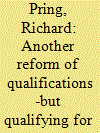

|
|
|
|
|
| Publication |
2013.
|
| Summary/Abstract |
There are several changes to the system of qualifications and examinations at ages 16 and 17, including the new English Baccalaureate. There are many problems: the constant churn in new qualifications reduces their vale to higher education and to employers; they are implemented without proper trialling; the EBacc in particular narrows the learning experience. There is a need for a moratorium on change and for a long, hard look by a non-politically partisan advisory committee on the development of a qualification system.
|
|
|
|
|
|
|
|
|
|
|
|
|
|
|
|
| 2 |
ID:
122469
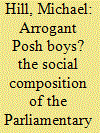

|
|
|
|
|
| Publication |
2013.
|
| Summary/Abstract |
In the light of the recent controversy over Andrew Mitchell's alleged 'pleb' comments to police officers and Nadine Dorries' characterisation of David Cameron and George Osborne as 'arrogant posh boys, this article examines the social composition of the parliamentary Conservative Party. It looks at previous attempts to widen the social base of the PCP and analyses the effect of Cameron's priority or 'A' list of candidates on the composition of the 2010 PCP. The article asks whether the perception that the Conservatives are the party of the rich has damaged the party's electoral appeal and if so what can be done to rectify the situation.
|
|
|
|
|
|
|
|
|
|
|
|
|
|
|
|
| 3 |
ID:
122462
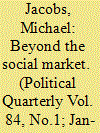

|
|
|
|
|
| Publication |
2013.
|
| Summary/Abstract |
Despite its worthy motives, social market philosophy provides neither a useful analytical framework for understanding modern capitalism, nor the policy tools to address our present economic and social predicament. The concept of 'market failure', with its underlying assumption of market equilibrium, does not capture the systemically adverse outcomes of collective market forces. A more sophisticated understanding of capitalist economies, and the societies in which they exist, would recognise that the market economy is a dynamic but not self-regulating system. It is embedded in, and impacts on, four other economies - of the natural environment, of family and care, of voluntary association, and of the public sector - which operate under different motivations and allocative principles. The role of government is central, to balance the values created by different kinds of institutions and to constrain the dynamic impacts of market forces. A number of policy conclusions are offered arising from this framework.
|
|
|
|
|
|
|
|
|
|
|
|
|
|
|
|
| 4 |
ID:
122476
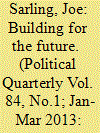

|
|
|
|
|
| Publication |
2013.
|
| Summary/Abstract |
The UK's housing problem has become an economic one. Finding ways to boost the supply of housing across the UK is currently near the top of the Government's economic growth and jobs agenda. As a result of failed policies over the past 60 years - policymakers' unwillingness to tackle NIMBY interests, a complex national planning system, developers' unwillingness and inability to build housing at the volume required to maintain stable prices, changing preferences amongst the population - the scale of the problem is vast. However, for any hope of success for the Government's housing strategy, it is vital to understand the extent to which the housing landscape varies significantly across different parts of the country.
|
|
|
|
|
|
|
|
|
|
|
|
|
|
|
|
| 5 |
ID:
122470
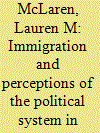

|
|
|
|
|
| Publication |
2013.
|
| Summary/Abstract |
Recently published research contends that concern about immigration is weakening the British political system by creating distrust in the elites and institutions in this system. Some may challenge this finding because the public opinion data used to illustrate this relationship is limited to the period of the recent Labour government, raising the possibility that it was an artefact of that era and thus may no longer hold. Using the most recent round of the European Social Survey (2010-11), this paper investigates whether this finding holds in the present era. The findings indicate that under the current Conservative-Liberal Democratic government, concern about immigration is still related to negative perceptions of the political system. This finding, along with those reported in previous research, points to potentially serious negative consequences for the functioning of the British political system, which are discussed in the concluding section of the paper.
|
|
|
|
|
|
|
|
|
|
|
|
|
|
|
|
| 6 |
ID:
122471


|
|
|
|
|
| Publication |
2013.
|
| Summary/Abstract |
Multiculturalism as an official policy strategy has recently come in for significant criticism in a number of Western European countries. A key criticism is that multicultural policies undermine redistribution policies, since they would erode the social cohesion upon which redistribution measures are built. However, empirical research does not univocally confirm this critique. This article explains why this is the case. The first argument is called the integration-recognition paradox. Policies that focus on recognising minority groups may lead to a greater social acceptance of those minorities, and in turn may lead to their feeling more appreciated as participants in society. In a second argument, the authors discuss how multicultural policies could easily be combined with policies that invest in national unity and social cohesion.
|
|
|
|
|
|
|
|
|
|
|
|
|
|
|
|
| 7 |
ID:
122468
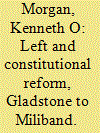

|
|
|
|
|
| Publication |
2013.
|
| Summary/Abstract |
Nineteenth-century constitutional reformers focussed on parliament. Their central idea was citizenship, modelled variously on the democracy of ancient Athens, small communities like Switzerland, and especially the United States, a particular inspiration for Gladstone who admired its constitution. The 1911 Parliament Act marked the final triumph of the Victorian Liberals legacy, with a very different impetus coming from Lloyd George during his coalition. Labour focussed on class, not the constitution, though the ILP favoured localism and devolution, before succumbing to a centralising unionism. Tawney championed the idea of social citizenship, emphasising activism and education. After 1945, Labour did not prioritize constitutional reform until the dramatic changes that came after 1997. Gordon Brown then revived the notion of citizenship, and possible codification, in pursuing the values of Britishness. Labour's legacy was a confusing one. But Ed Miliband's policy revision could reclaim the idea of citizenship, an egalitarian concept to counter the inequalities of class.
|
|
|
|
|
|
|
|
|
|
|
|
|
|
|
|
| 8 |
ID:
122466
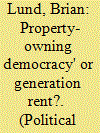

|
|
|
|
|
| Publication |
2013.
|
| Summary/Abstract |
A property owning democracy' has been at the centre of Conservative Party social policy since Noel Skelton coined the phrase in 1924. The idea has been underpinned by contrasting the independent, hygienic, suburban homeowner with the urban, managed, flat-dwelling, high-density council tenant. No Conservative-led government has left office with a homeownership rate lower than when it came to power and the right to buy has enabled this growth to be maintained. However, in 2005, homeownership started to decline and this drop has continued into the Coalition government's term of office with more households now exiting owner-occupation into the private landlord sector than entering owner-occupation from private renting. The 'reinvigorating' the right to buy is an attempt put a 'property owning democracy' back on track but, should it fail, the Conservative Party may turn to more radical policies such as sale on vacant possession of 'high value' local authority and housing association houses.
|
|
|
|
|
|
|
|
|
|
|
|
|
|
|
|
| 9 |
ID:
122473


|
|
|
|
|
| Publication |
2013.
|
| Summary/Abstract |
Britain has participated in several military interventions of varying duration, extent and political controversy in recent years. This article analyses public opinion towards the most recent intervention in Libya in 2011, looking at three different aspects of the topic. First, it examines differences in cross-national attitudes towards military action in Libya amongst NATO countries. Secondly, it then looks in detail at which social groups were more or less likely to approve of British involvement, comparing this with group attitudes towards Britain's role in Afghanistan and Iraq. Thirdly, it assesses how public opinion shifted during the course of the action in Libya, looking at three key indicators of the popular mood: whether Britain was right or wrong to take military action; how well the war is going; and assessments of David Cameron's handling of the conflict. Broader reflections are then made about public opinion towards British involvement in future military action.
|
|
|
|
|
|
|
|
|
|
|
|
|
|
|
|
| 10 |
ID:
122463
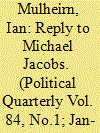

|
|
|
| 11 |
ID:
122467


|
|
|
|
|
| Publication |
2013.
|
| Summary/Abstract |
Political support for renewable energy development, especially offshore renewables, is particularly conspicuous in Scotland and is a centrepiece of SNP policy. However, this is built on something of a paradox because, put simply, without the subsidies paid by electricity consumers in the rest of the UK, the Scottish Government's ambitious targets for renewable energy would be politically unachievable. We argue in this paper that if Scotland does move towards independence, then there could be little reason for the UK to continue paying (much) of the subsidies since the resulting renewable generation would no longer contribute towards UK renewable energy targets. We suggest that the potential scenarios, and their implications, needs to be far better considered in the arguments around the Scottish constitutional position and the broader aims of UK energy policy.
|
|
|
|
|
|
|
|
|
|
|
|
|
|
|
|
| 12 |
ID:
122465


|
|
|
|
|
| Publication |
2013.
|
| Summary/Abstract |
The welfare reforms of the Coalition government are marked by the legacy of Thatcherism. Social security reforms in the 1980s reshaped the system towards reliance on means-tested benefits. Negative policy feedback created by the opacity and perverse effects of means-testing has made these benefits an easy target for the Coalition, at least so far as working age people are concerned. Different policy feedbacks affect policy towards old age pensions. The government is locked into promoting private pensions, and is extending this commitment with automatic enrolment. To make private pensions pay, it has to reverse the slide to means-testing. The implication is that the pronounced bias against the working poor and in favour of older people in Coalition policy is not simply a matter of electoral preferences: rather, it reflects the political effects of previous policy decisions.
|
|
|
|
|
|
|
|
|
|
|
|
|
|
|
|
| 13 |
ID:
122461


|
|
|
|
|
| Publication |
2013.
|
| Summary/Abstract |
Markets are powerful tools for reform in both the public and private realms. But those markets need careful design and stewardship if they are to work to create value rather than simply becoming a mechanism for distributing rents to private investors. SMF Director Ian Mulheirn examines how the social market framework offers the most cogent analysis of recent events and how it can be a vital guide for future policy.
|
|
|
|
|
|
|
|
|
|
|
|
|
|
|
|
| 14 |
ID:
122472


|
|
|
|
|
| Publication |
2013.
|
| Summary/Abstract |
This article studies the ideational underpinnings of the UK Coalition government's 'liberal conservative' foreign policy. It begins by suggesting that an Iraq-centric account of Blair's foreign policy suggests a grand vision on the prime minister's part that was lacking from his earlier foreign policy adventures, which relied on a more conventional form of British statecraft. The second section contends that the Gordon Brown years 2007-10 and, since the end of New Labour, Coalition foreign policy, can be seen as a response both to the substance and style of Blair's highly personalised stewardship of foreign policy post-9/11. The war on terror and the invasion of Iraq were accompanied by a seemingly open-ended democracy promotion around the globe which was quite out of character with past British practice. The article argues, therefore, that under Brown and Cameron cautious pragmatism has tended to win out over the proclamation of grand strategic ambition.
|
|
|
|
|
|
|
|
|
|
|
|
|
|
|
|
| 15 |
ID:
122474
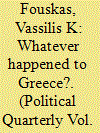

|
|
|
|
|
| Publication |
2013.
|
| Summary/Abstract |
The sovereign debt crisis in Greece and other periphery countries is a yardstick for the viability of the European project: if Greece defaults and exits the Euro-zone, then the entire European architecture will be questioned. This article examines the origins of the Greek debt crisis and argues that the key sources of the debt are the economic and political factions that have dominated Greek politics since the fall of the Colonels in summer 1974 amidst the Cyprus calamity. These factions (political parties, comprador economic interests etc.), whose policy actions and preferences are amalgamated with the interests of Euro-Atlantic elites, are now being severely undermined, both politically and economically, as the prosperity of the Greek middle classes is eroded following two years of harsh austerity measures imposed on the Greek ruling factions by those Euro-Atlantic elites. Furthermore, this article outlines ways out of the Greek debt crisis, putting into test some reasonable policy proposals that are being widely discussed in Greece and abroad.
|
|
|
|
|
|
|
|
|
|
|
|
|
|
|
|
| 16 |
ID:
122464


|
|
|
|
|
| Publication |
2013.
|
| Summary/Abstract |
This paper starts out from a puzzle. During the past thirty years, incomes have grown more unequal, a small group at the top has captured a much greater share of resources and poverty has increased. Despite this, most people are markedly less likely to want government to redistribute income or tackle poverty and are less sympathetic towards those without jobs. The greater insecurity of many people's lives in the current crisis renders the issue more perplexing. This paper describes trends in inequality, poverty and unemployment; presents new data on attitudes, media discussion and political platforms; discusses theoretical approaches from social psychologists, political scientists, sociologists and other commentators; and considers how a more generous welfare state might be pursued.
|
|
|
|
|
|
|
|
|
|
|
|
|
|
|
|
|
|
|
|
|